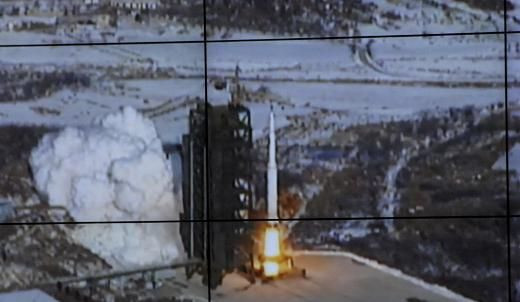North Korea Launches Satellite; US Confirms Object In Orbit

North Korea launched its second long-range rocket of 2012 Wednesday morning in what it said was a bid to put a satellite into space.
The Pyongyang government hailed the launch as a success after an earlier shot failed 80 seconds after takeoff in April.
"The satellite has entered the planned orbit," North Korea's state news agency KCNA said, according to Reuters.
U.N. Security Council diplomats said the 15-nation body would discuss the launch during a scheduled meeting on other issues that begins at Wednesday 10:00 a.m. EST (1500 GMT) Japan had requested a Security Council meeting on the missile launch, Reuters reported.
"North American Aerospace Defense Command officials acknowledged today that U.S. missile warning systems detected and tracked the launch of a North Korean missile at 7:49 p.m. EST [9:49 a.m. Wednesday in North Korea]. The missile was tracked on a southerly azimuth. Initial indications are that the first stage fell into the Yellow Sea. The second stage was assessed to fall into the Philippine Sea. Initial indications are that the missile deployed an object that appeared to achieve orbit. At no time was the missile or the resultant debris a threat to North America."
Japanese officials said it flew over Okinawa. Government spokesman Osamu Fujimura said later Wednesday that no debris hit Japanese territory, the Associated Press reported.
U.N. Secretary-General Ban Ki-moon on Wednesday strongly condemned North Korea's missile launch and expressed concern that it could negatively impact prospects for peace and security in the region, Reuters reported.
"The Secretary-General deplores the rocket launch announced by the Democratic People's Republic of Korea," Ban's spokesman Martin Nesirky said in a statement, Reuters reported.
The first stage of the rocket was expected to fall in the Yellow Sea and the second stage in waters east of the Philippines, according to South Korea. Fujimura described two confirmed debris sites in those general areas after the launch.
The first of three stages was due to last about two minutes before burning out and falling into water west of South Korea, according to plans North Korea submitted to international aviation and marine authorities. Parts of the nose cone, or fairing, were projected to drop off west of South Korea's Jeju Island, the Journal reported.
The second stage was expected to go east of Taiwan before burning out east of the Philippines.
South Korean President Lee Myung-bak convened an emergency meeting in response, and Japan condemned the launch, Bloomberg reported. The United States and China have not reacted officially.
“The government of Japan believes this launch threatens the peace and security of the region and it is against relevant U.N. Security Council resolutions,” Chief Cabinet Secretary Osamu Fujimura said at a press conference in Tokyo. “The launch is in no way acceptable, and we strongly protest against North Korea.”
The launches Wednesday and in April came from a site on the west coast, in the village of Tongchang-ri, about 35 miles (56 kilometers) from the Chinese border city of Dandong, across the Yalu River from North Korea, CBS reports. The site is 45 miles (70 kilometers) from the North's main Yongbyon nuclear complex, and is said to have better roads and facilities than previous sites and to allow a southerly flight path to keep the rocket from flying over other countries.
The North launched the rocket close to the first anniversary of the death of dictator Kim Jong-il and as elections loom in South Korea and Japan.
Pyongyang says it is entitled to launch a satellite into space but critics say the rocket development is aimed at nurturing the kind of technology needed to mount a nuclear warhead on a long-range missile.
North Korea is banned from conducting missile and nuclear-related tests under U.N. sanctions imposed after its 2006 and 2009 nuclear tests.
The latest launch comes after a failed attempt in April that fizzled less than two minutes after blast-off.
Japan and South Korea put their armed forces on alert before the launch. Most political analysts believe the launch is designed to bolster the credentials of new leader Kim Jong-un as he cements his rule.
A South Korean official in Seoul said recently that the transition of power to Kim Jong-un did not appear to be going as smoothly as anticipated and there were signs that the regime was concerned over the possibility of rising dissent.
Plans for the launch had drawn criticism from South Korea, Russia, Japan and the United States as well as NATO and the United Nations.
The North's only major diplomatic ally, China, had expressed "deep concern" before launch but is thought unlikely to back any further sanctions against its ally.
© Copyright IBTimes 2024. All rights reserved.





















